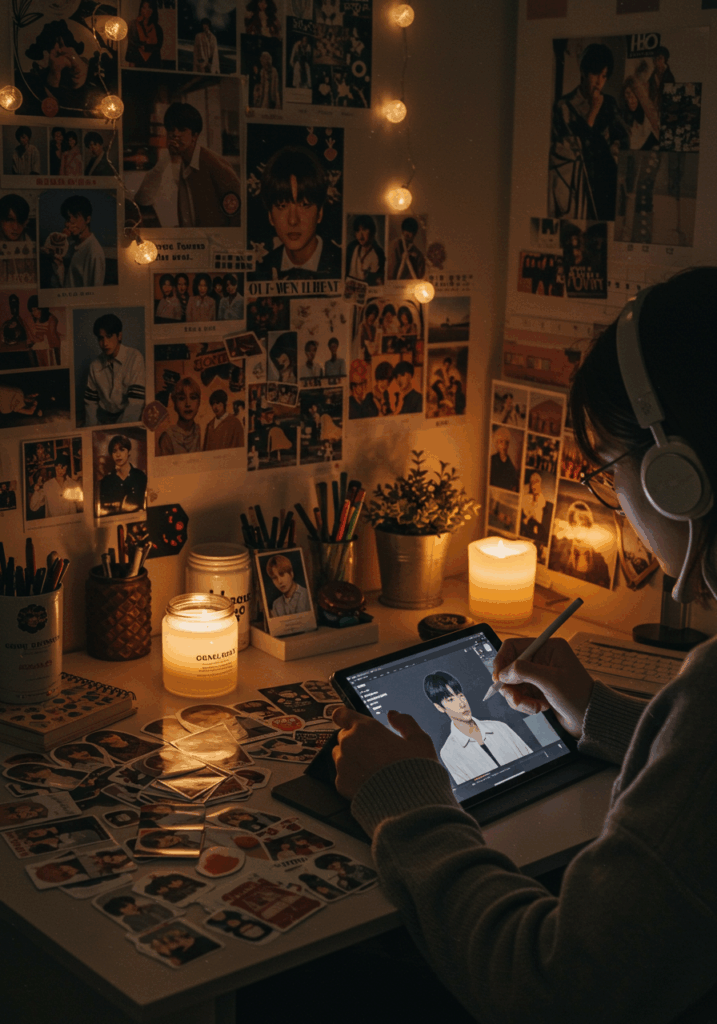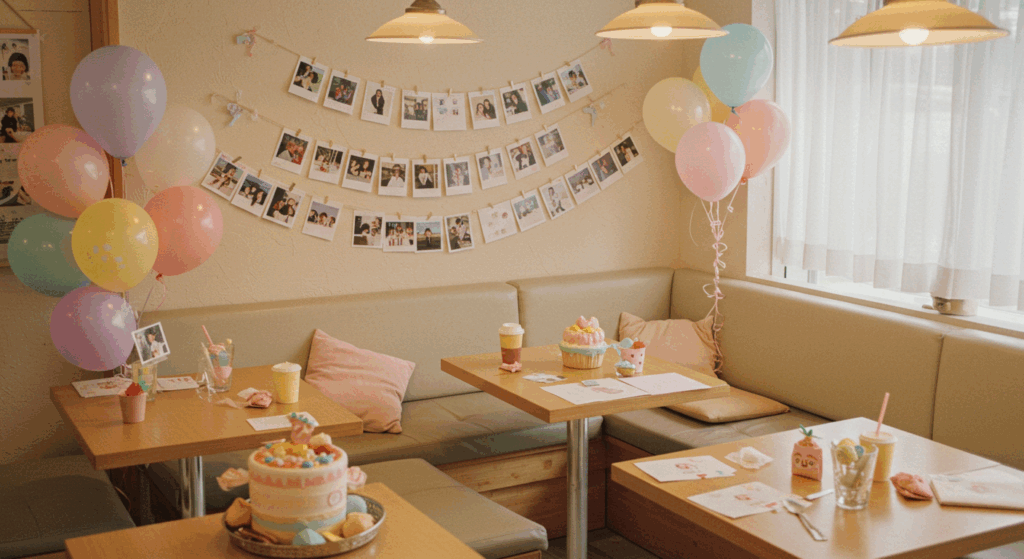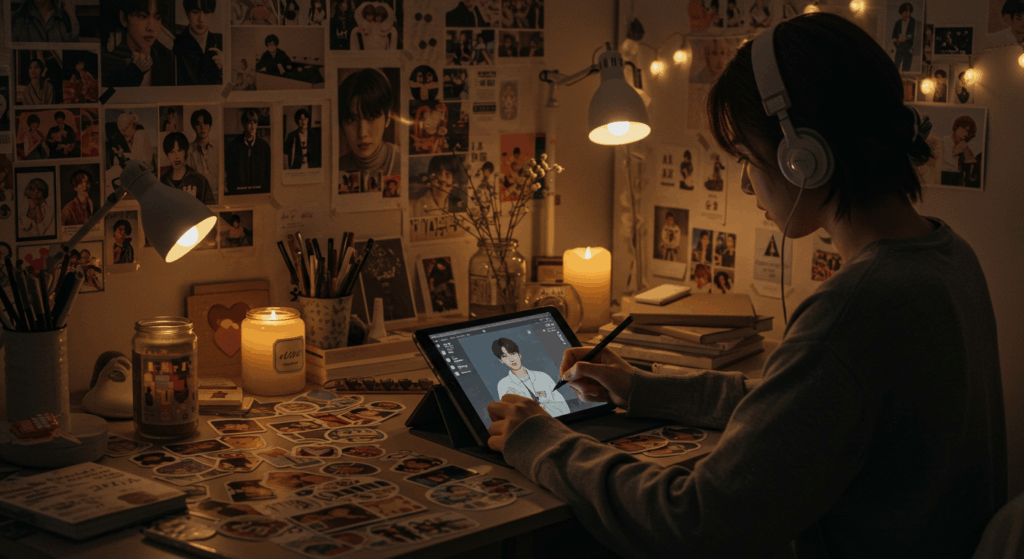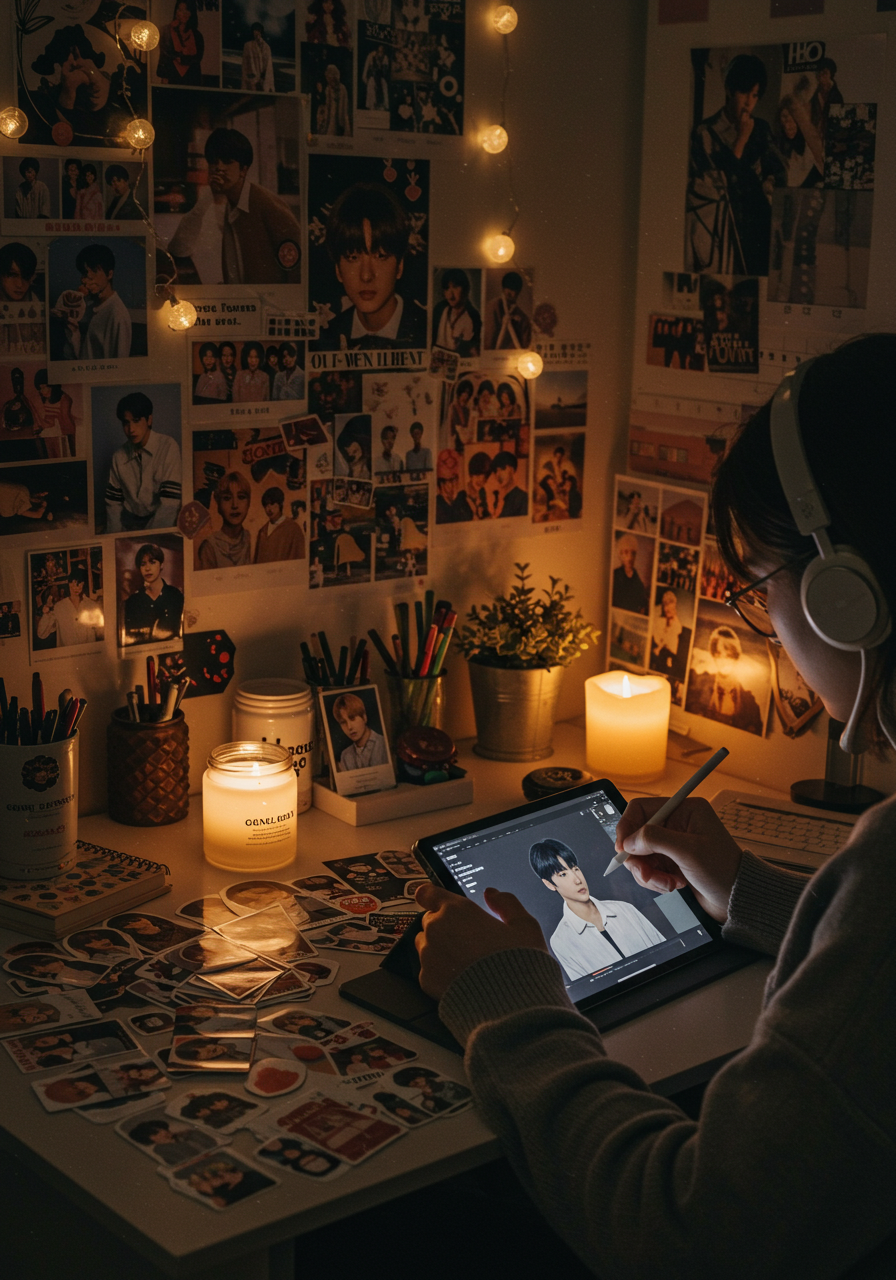
What Does “Deokjil” Mean?
The essential understanding of Korean youth culture depends on learning the fundamental term 덕질 (deokjil).
The Korean term 덕질 (deokjil) stems from the Japanese “otaku” word 덕후 (deokhu) to describe active and passionate fandom engagement. Korean deokjil differs from the English “fan” because it represents an intense interactive relationship with fandom activities. The practice exists as an intense creative and emotional communal process which plays a vital part in Korean Gen Z and Millennial identity expression.
People who are deokjil enthusiasts dedicate their time to following K-pop idols while also developing intense enthusiasm for fictional characters as well as anime and webtoons and comedians and athletes. The fandom activity extends beyond content consumption alone. People join this culture to share their love for things or people with fellow fans who experience similar passions.
Not Just Supporters — Planners, Designers, Marketers
The main distinctive characteristic of Korean deokjil culture shows its strong proactive nature. Fans demonstrate their commitment through active creation of new content. The fan base engages in various activities by creating birthday promotional ads and purchasing subway billboards as well as organizing donation drives and financing full-scale media promotion campaigns under their favorite idol’s name.
University students aged 22 typically plan Times Square K-pop idol birthday advertisements using money collected from Twitter fan communities. Teenage fans create their own custom slogan towels and photocards and enamel pins for fan events while donating all proceeds to animal shelters under the idol’s name.
These aren’t rare exceptions. These represent common instances of Korean fandom culture actively in motion. The activities need project management abilities along with graphic design expertise and crowdfunding skills and logistics capabilities and social media marketing knowledge and additional competencies. The initial experience of authentic work-related tasks and innovative thinking for many Gen Z fans emerges through their involvement with deokjil.
Fan Cafés, Pop-Ups, and Café Events
The traditional physical fan café event stands as a core element of deokjil culture throughout Korea. The term “fan café” within this context refers to physical locations where fans acquire space to transform into customized birthday and anniversary celebration venues for their chosen celebrities.
Fans create complete custom-made decorations that include banners and cupsleeves as well as photo zones and QR playlists and gift bags for their events. Fans wear thematic costumes while using their cameras to take beautiful pictures before posting their experiences on Instagram Twitter (X) and TikTok.
The design process extends for months as fans create everything from typographic posters to drink selections that match their idol’s individual character traits. The events generate widespread viral success which draws fans alongside tourists and media organizations. The events established themselves as a standard practice for Korean fans throughout the fandom industry.

“Bias” and Identity: A Personal Love Story
All Korean K-pop fans share the same experience of having a bias which represents their most beloved group member. The way fans express bias exceeds basic admiration. The connection people develop with their bias often transforms into an intense and powerful emotional bond.
Fans report that their bias provided essential support during difficult periods including depression and anxiety as well as academic challenges. When idols dedicate effort to improvement and smile during performances or display kindness in interviews fans experience personal connection points.
Some describe it like a silent friendship. Others say it feels like watching someone grow up alongside you. Social media profile bios frequently display this preference. User profiles display content that says “OT7 but Jungkook is my bias 💜” while also showing fan art and motivational quotes.
Deokjil creates a deep connection between identity formation. Music and merchandise collection alongside fan-created artwork serve as self-expression tools that show both personal identity and social connections to others.
Online Communities: Where Fandom Lives
Deokjil doesn’t happen in a vacuum. People can find deokjil through Twitter and Instagram alongside TikTok and Naver Café and Discord platforms. Korean fan communities demonstrate high organizational skills by establishing formal online groups which divide tasks into admin roles and translation duties and design responsibilities and moderation functions.
These communities have members who interpret foreign interviews while setting the record straight regarding false information and developing fan schedules which include comeback streaming guides alongside fact-checking fake rumors. It’s part passion, part duty. The expression “팬질은 노동이다” exists to describe “Fandom is labor.”
The people dedicate their work to this mission while showing affection to their tasks. The online platforms enable fans to develop meaningful friendships with individuals they might never encounter in person. The members of the fan community exchange birthday presents with each other and provide emotional support during difficult times while sharing in each other’s special events including both idol-related and personal achievements.
A Creative Economy of Love, Fandom
The Korean fandom operates its own specialized economic system. Fans produce merchandise products including homemade keychains and stickers as well as digital wallpapers and photobooks. The products they create exceed official merchandise quality while offering more individualized touches.
Many professional paths develop through fandom activities. The beginning point for K-pop stylists and fan community managers and entertainment marketers and illustrators was designing merchandise for their favorite groups. The emotional fulfillment of deokjil transforms into a pathway toward professional success for many fans.
Non-creative supporters make meaningful contributions to these activities. Fans participate in music streaming while using social media promotion tools and voting in ranking applications alongside digital strategy analysis to support their preferred brand endorsements.
Beyond K-pop: Webtoons, Actors, and Fictional Universes
The fandom activities in K-pop represent only one part of a broader spectrum which includes webtoons and actors and fictional universes.

K-pop represents the most globally recognized form of deokjil but Korean fandom encompasses more than musical entertainment. Devoted fan bases exist for both actors and voice actors and esports competitors as well as webtoon characters. The Korean fanart (팬아트) community shows strong interest in fictional universes which include Supernatural, Attack on Titan and Howl’s Moving Castle.
This extended fan culture combines fanfiction production with roleplaying activities and cosplay practices alongside “shipping” activities which take place through Tumblr-style blogs and private Discord servers.
Deokjil exists beyond its original medium because its primary limitation stems from personal enthusiasm.
The Emotional Core of Deokjil
The core emotional value of deokjil lies in providing comfort to its members.
The core value of deokjil consists of providing emotional comfort to its members.
A culture of emotional literacy, creativity, and support exists as a result of Korean Gen Z creating this space in which members feel comfortable expressing themselves emotionally.
Korean Gen Z has developed a fan culture which allows people to freely express their deep emotions without fear of criticism. A place where love becomes a project.
Conclusion
People outside the fandom community often perceive Korean fan culture as excessive. Inside this fandom exists a complex structure which combines tenderness and beauty.
The practice of deokjil exceeds mere appreciation for something. Loving something becomes a complete dedication through creative emotional expression without apology. The fandom involves staying up late to make posters as well as donating on behalf of your idol while watching concerts online through tears while building enduring relationships on Twitter.
Korea’s young adults use fandom as a tool to construct their personal purpose in life. A way to build meaning. The fandom serves as a method to live more audaciously while loving more intensely and forming deeper connections with others.
Solo Culture in Korea: Alone, but Fulfilled
Meaning-Out in Korea: When Buying Becomes Belief
Hyperlocal Travel : How Gen Z Finds Adventure Next Door
Cafe Hopping in Korea: Aesthetic Escapes of the MZ Generation
